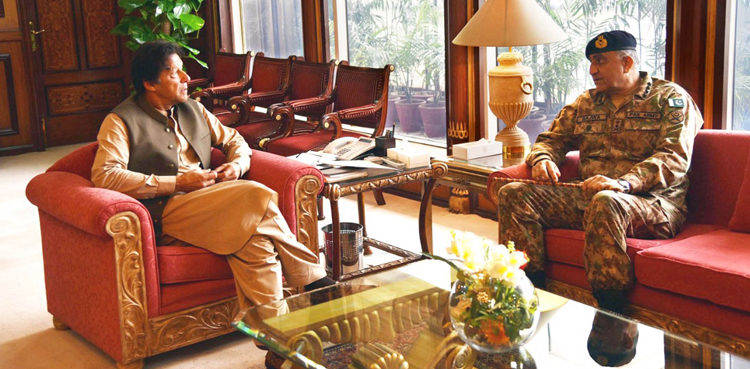While Imran Khan was whining like a baby at the United Nations General Assembly and threatening the world with nuclear war, Pakistan’s Army Chief General Bajwa, the true power centre in Pakistan was busy plotting a coup against Imran Khan and his government. After embarrassing Pakistan at the UNGA, Imran Khan stands isolated in Pakistan and a soft coup carried out by the ISI-military deep state is on display.
Pakistan’s deteriorating economy is a major cause of concern for the Pakistan Army and Bajwa has virtually assumed the role of the Prime Minister as he held private meetings with top business leaders in an attempt to arrest the slump as the Army faces the heat from Pakistan’s economic downturn.
Bajwa, through the successive meetings looked to explore ways to fix up the economy and shore up the investments and unsurprisingly, few of the meetings led to some prompt decisions which included sending directions to top government officials as Pakistan Army chief Bajwa becomes increasingly wary of the rapidly deteriorating economy. It is important to note that for the first time in a decade, the defence spending has been frozen as the Imran Khan government has bucked the trend of giving an annual hike to the Army which had become a norm. Pakistan’s economy can seriously hamper its Army’s terror operations as they look to destabilise the Kashmir Valley in the wake of abrogation of Article 370. The Pakistan Army continues to be on a high alert as it steps up its effort to spread terrorism in India and Afghanistan but its operations will be severely hampered by the paucity of funds which has perhaps prompted the Bajwa to step in and act as the Prime Minister as Imran Khan’s incompetence is laid bare.
The Pakistan Army owns enterprises in every sector and is deeply embedded in the country’s economy as it runs The Fauji Foundation which happens to be Pakistan’s second-largest conglomerate, with interests in everything from food to power. The stakes have been raised especially with no increase in defence budget allocation and its investments are at a high threat with the economy in the doldrums.
This move has resulted in many in Pakistan questioning the strong-arm tactics as Yousuf Nazar, a former Citigroup inc. banker and author of a book on Pakistan’s economy said: “The growing role of the military in the economy’s management in addition to its traditional dominance of the security matters is nothing but a soft coup that is a setback for the democratic process. This will have far-reaching repercussions,” he said, adding generally that strong-arm methods for management will not work for basic economic and social issues.”
Pakistan is currently witnessing its slowest economic growth in over a decade which stands at a lowly 2.4% and has recently secured a $6 billion loan from IMF under strict conditions. Pakistan is already debt ridden with massive funds borrowed from China, more than even the IMF. Pakistan’s budget deficit rose to 8.9% of GDP making it the highest in nearly three decades. Imran Khan inherited an ailing economy and comfortably dug its grave through his sheer incompetence Toyota’s local unit to Power Cement Ltd. having reduced production while many others, including Nestle SA’s Pakistan unit, have cut their workforce.
This is not the first time that Pakistan’s Army has meddled in civilian affairs as it remains notorious for throwing out elected governments. The political history of Pakistan has many such precedents. In 1958 when the democratic government failed to control the riots and asked for military help, the armed forces instigated a coup and snatched the power. The country was under the leadership of two military generals namely Ayub Khan (1958-1969) and Yahya Khan (1961-1971). When Pakistan lost 1971 war to India, Yahya khan was disposed to pave the way for politicians and former foreign affairs minister Zulfikar Ali Bhutto.
A few years later, Bhutto was disposed by another Military general Muhammad Zia ul Haq who ruled the country with iron fist for more than a decade till 1988. In 1999 too, chief of army staff Pervez Musharraf disposed democratically elected Nawaz Sharif on the pretext of Kargil war. Therefore, Pakistan has a long history of the elected leaders being disposed in favor of Military generals during war, pretext of or after war. So, it is very likely that Military chief Qamar Javed Bajwa will dispose Imran khan as scapegoat if the people’s anger does not simmer down.
The events prove that Imran Khan, dubbed as a puppet Prime Minister, and his government are nothing but a piece of furniture as its army continues to hide behind the curtain of democracy to escape sanctions for directly supporting terrorism. Imran Khan has also been on a spree to humiliate Pakistan and its Army as through his various gaffes has exposed the country’s Islamist form of thinking through its tacit support to terror groups like Al-Qaeda and JuD. While the future remains uncertain for Imran Khan and his government, Bajwa has stepped out of the shadows to compensate for Imran Khan’s incompetence and in the process, revealing that the reins of the Islamic republic of Pakisatan lie in the hands of the military.




























